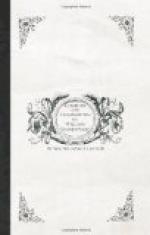Quin.
{106a} Another untoward blot! but leaving no doubt of the word. The only doubt is whether he meant the muzzle of the animal itself, or one of those leathern muzzles which are often employed to coerce the violence of ferocious animals. In besieged cities men have been reduced to such extremities. But the muzzle, in this place, we suspect, would more properly be called the blinker, which is often put upon bulls in pastures when they are vicious.
{108a} This would countenance the opinion of those who are inclined to believe that Shakspeare was a Roman Catholic. His hatred and contempt of priests, which are demonstrated wherever he has introduced them, may have originated from the unfairness of Silas Gough. Nothing of that kind, we may believe, had occurred to him from friars and monks, whom he treats respectfully and kindly, perhaps in return for some such services to himself as Friar Lawrence had bestowed on Romeo,—or rather less; for Shakspeare was grateful. The words quoted by him from some sermon, now lost, prove him no friend to the filchings and swindling of popery.
{111a} It is a pity that the old divines should have indulged, as they often did, in such images as this. Some readers in search of argumentative subtility, some in search of sound Christianity, some in search of pure English undefiled, have gone through with them; and their labours (however heavy) have been well repaid.
{124a} Tilley valley was the favourite adjuration of James the Second. It appears in the comedies of Shakspeare.
{133a} Whoreson, if we may hazard a conjecture, means the son of a woman of ill-repute. In this we are borne out by the context. It appears to have escaped the commentators on Shakspeare.
Whoreson, a word of frequent occurrence in the comedies; more rarely found in the tragedies. Although now obsolete, the expression proves that there were (or were believed to be) such persons formerly.
The Editor is indebted to two learned friends for these two remarks, which appear no less just than ingenious.
{153a} Belly-ache, a disorder once not uncommon in England. Even the name is now almost forgotten; yet the elder of us may remember at least the report of it, and some, perhaps, even the complaint itself, in our school-days. It usually broke out about the cherry season; and in some cases made its appearance again at the first nutting.
{157a} Sir Thomas borrowed this expression from Spenser, who thus calls Queen Elizabeth.
{159a} Humboldt notices this.
{164a} Pragmatical here means only Precise.
{181a} It is doubtful whether Doctor Buckland will agree with Sir Thomas that these petrifactions are ram’s-horns and lampreys.
{189a} She was then twenty-eight years of age. Sir Thomas must have spoken of her from earlier recollections. Shakspeare was in his twentieth year.




